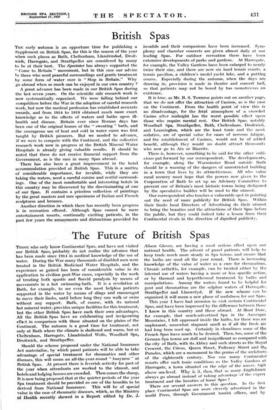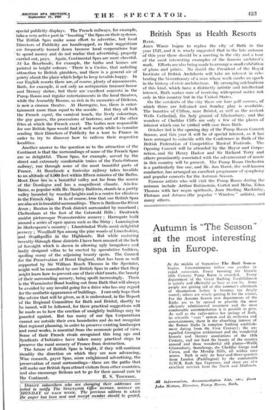The Future of British Spas
THOSE who only know Continental Spas, and have not visited our British- Spas, probably ,do not realize the advance that has been made since 1914 in medical knowledge of the use of water. During the War many thousands of disabled men were treated in the British Medicinal Water Hospitals, and the experience so gained has been of considerable value in its application to civilian post-War cases, especially in the work of treating both spastic and flaccid paralysis by means of movements in a hot swimming-bath. It is a revelation at Bath, for example, to see even the most helpless patients supported in the water by means of slings and encouraged to move their limbs, until before long they can walk or swim without any support. Bath, of course, with its natural hot mineral water, provides unique facilities for this treatment, but the other British Spas have each their own advantages. All the British Spas have an exhilarating and invigorating effezt in comparison with those situated on the plains of the Continent. The autumn is a good time for treatment, not only at Bath where the climate is sheltered and warm, but at Cheltenham, Harrogate, Llandrindocl Wells, Woodhall Spa, Droitwich, and Strathpeffer.
Should the scheme proposed under the National Insurance Act materialize, by which panel patients will be able to take advantage of special treatment for rheumatics and other diseases, this will mean an all-the-year-round " busyness " at British Spas. At present there is feverish activity for part of the year when attendants are worked to the utmost, and hotels and lodging-houses are crowded. Then comes the slump. It is now being proposed that at the quieter periods of the year Spa treatment should be provided as one of the benefits to be derived from National Insurance. This will be of special value in the case of rheumatic diseases, which, as the Ministry of Health recently showed in a Report edited by Dr. J. Alison Glover, are having n most serious effect upon our national health. The advent of panel patients will help to keep trade much more steady in Spa towns, and ensure that the baths are used all the year round. There is increasing knowledge of the value of water as a cure -for rheumatism. Chronic arthritis, for example, can be treated either by the internal use of waters having a more or less specific action, or by thermal and hyperthermal treatment by baths and manipulations. Among the waters found to be helpful for gout and rheumatism are the sulphur waters of Harrogate, Strathpeffer and Llanwrtyd. If the new scheme can be organized it will mean a new phase of usefulness for our Spas.
This year I have had occasion to visit certain Continental Spas, and have been impressed by the difference between those I know in this country and those abroad. At Mont Dore, for example, that much-advertised Spa in the Auvergne Mountains, I felt oppressed inside the baths, for there was an unpleasant, somewhat stagnant smell as if all the fresh air had long been used up. Certainly in cleanliness some of the French Spas leave much to be desired. Then, too, some of the German Spa towns are dull and insignificant as compared with the city of Bath, with its Abbey and such streets as the Royal Crescent, the Circus, Queen Street, Pulteney Street and the Parades, which are a monument to the genius of the architects of the eighteenth century. Nor can many Continental resorts offer such tonic conditions as the Valley Gardens at Harrogate, a town situated on the edge of the moors, high above sm-level. Why is it, then, that so many Englishmen always go abroad instead of taking advantage of the expert treatment and the beauties of home Spas ?
There are several answers to this question. In the first place Continental Spas are more cleverly advertised in the world Press, through Government tourist offices, and by
-special publicity displays. The French railways, for example, take a very active part in " boosting" the Spas on their systems. The British Spas make some effort to advertise, but local Directors of PublieitY are handicapped, as their suggestions are frequently turned down because local corporations fear to spend money and do not realize that advertising,-properly carried out, pays. Again, Continental Spas are more cheerful. At ,-La Bouiboule, fOr example, the baths and houses are painted in bright-colours. --There is-a Casino, that unfailing ' attraction to British ghinblers, and there is .a general air of gaiety about the place which helps to keep invalids haPpy. In our English resorts there are, of course, plenty of ainuseinents. Bath, for exampk, is not only an antiquarian treasure-house and literary shrirt-e,-".but there- are-excellent concerts in the
• Pump Room and iegalai entertainments in the local theatres, while the Assembly Rooms, so rich in its memories of Dickens,
• is no* a cinema theatre. At Harrogate, too, there is enter- :tainment more than equal to the seaside. But they all lack ' the French esprit, the carnival touch, the lively colourings, the gay games, the processions of lanterns, and all the other fetes at which the French excel. The bodies now responsible for our British Spas would find it well Worth while to consider sending their Directors of Publicity for a tour to France in order to try .to discover 'how to -enliven their respective localities.
Anoth.er answer to the question as to the attraction of the :Continent is that the Surroundings of some of the French Spas are So delightful. Those_ Spas, for _example, served by the direet and.,extremely comfortable trains of the Paris-Orleans railway; run' through Some of the most beautiful parts of Fiance. At Ilourboule a funicular railway takes invalids to an altitude 3,9O feet within fifteen Minutes of the Baths. :Mont. Dore lies'in a beautiful valley: not far from the source of the-bordiigne :and- has a _magnificent climate. - Aix-les- Bains, so popular with Mr. Stanley Voldwin, stands in a pretty valley bounded by woodgl heights midis a centre for climbers in the Frenek Alps. It is, of course,-true that our British Spas
„
are also set in beautiful surroundings. There is Bath on the River ;Avon ; Buxton in the Peak district surrounded by moorland ; Cheltenham at the foot of the Cotswold Hills ; Droitwich amidst picturesque Worcestershire scenery ; Harrogate built around a series of Open iniees such as the Stray; Leamington in Shakespeare's country ; Llandrindod Wells amid delightful scenery; Woogliall Spa among the pine woods of Lincolnshire, 'rind StiNptlipeffer in the Highlands:. But While- motoring )recently-'Though these districts thave been amazed at the lack of foresight which is shown in allowing ugly bungalows and ;badly designed villas to be erected by speculative builders, :spoiling many of the adjoining beauty spots. The Council for the Preservation of Rural England, that has been so well .supported by Sir William Beach Thomas in the Spectator, ;might well be consulted by our British Spas in order that they might learn how to prevent one of their chief assets, the beauty of their surrounding scenery, being. spoilt increasingly. There 18 the Warminster Road leading out from Bath that will always be avoided by any invalid going for a drive who has any regard :for the aesthetic appearance of buildings. lean only hope that the advice that will be given, so it is understood, in the Report of the Regional Committee for Bath and Bristol, shortly to :he issued, will be followed, for there practical suggestions will ))e made as to how the erection of unsightly buildings may be guarded against. But too many of our Spa Corporations 7cannot see outside their own boundaries and do not recognize that regional planning, in order to preserve- existing landscapes and rural works, is essential from the economic point of view. $ome of their French rivals recognized this long ago and yndicats d'Initiative have taken many practical steps to preserve the rural scenery of France from destruction. i The future of British Spas is bright, if they will continue steadily the direction on which they are HOW advancing. Wise research, gayer Spas, more enlightened advertising, the Preservation of rural surroundings—these are the paths that Will make our British Spas attract visitors from other countries, and also encourage Britons not to go for their annual cure- tO















































 Previous page
Previous page